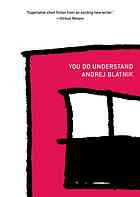
You Do Understand
Slovenian Literature
- اطلاعات
- نقد و بررسی
- دیدگاه کاربران
نقد و بررسی

July 26, 2010
Fifty brief, knotty thrusts at life's conundrums make up this hip collection. Themes of failure—particularly in love—dominate, as in the compendium of excuses the narrator of "And Since I Couldn't Sleep" makes the morning after she's left the apartment of a man she's finally slept with. In "An Almost Perfect Evening," the buttoned-down narrator wishes his equally well-brought-up date would reveal a drastic fault. A humorous mixup occurs in "Words Matter," when a lonely man in a hotel room calls the number on a card offered by the desk clerk, though he has misunderstood the card's purpose ("So, you're not..." "No, I'm not"). And what to make of a world in which a person can go to bed a bank mogul and wake up a rickshaw driver? Each of these short bursts (most are barely a page long) bubbles with a droll, dry humor handily captured by Soban's dead-on, deadpan translation.

August 1, 2010
Slovenian author Blatnik (Skinswaps) collects short short stories--some as brief as one sentence--that are "concentrated moments of time" that insist readers take an active role in their creation. As when viewing a Kertesz photograph, readers are drawn to the shadow, toward the mystery formed by the nameless characters in their familiar yet foreign surroundings. These stories hold your attention long after you've closed the book. In "Voyeur," for instance, Blatnik's spare description of a tabletop and a woman's simple confession provides enough information for an engaged reader to echo the narrator by thinking, "What an appealing story!" The final story, "Marks," gives the greatest clue as to what Blatnik intends his stories to be. Like the piece's bookmarks, his stories are demonstrations of the infinitely possible. Reading a fully conceived story, says the narrator, is pointless. VERDICT These stories are mostly about misunderstanding and dissatisfaction. As imperfect as language is, Blatnik suggests, it's our best hope for connecting with people. The title--expressed as a question in one of the stories, it clearly implores hope--declares that true human connection is within our capacity. Readers who actively participate in Blatnik's imaginative process will be richly rewarded.--K.H. Cumiskey, Duke Univ. Lib., Durham, NC
Copyright 2010 Library Journal, LLC Used with permission.




دیدگاه کاربران